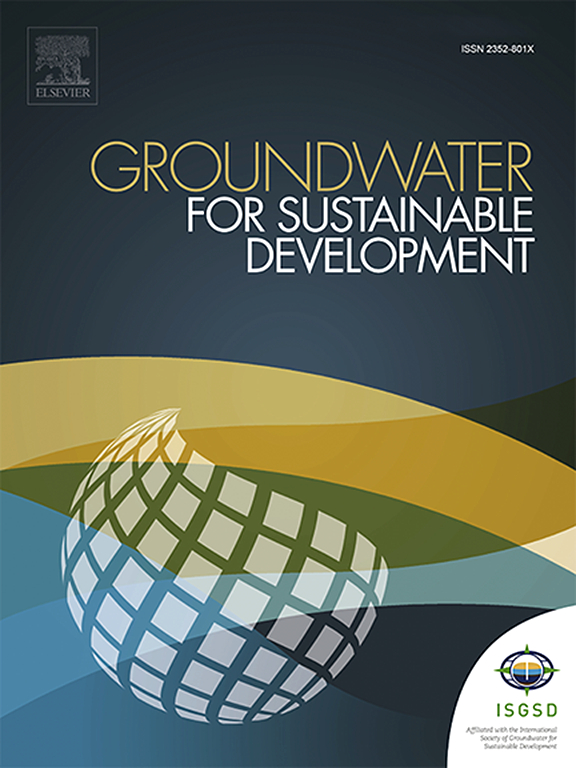The efficiency of Iran's sectoral policies through the lens of GEFL (Groundwater Energy Food Land) Nexus in comparison with the sectoral view
IF 4.9
Q2 ENGINEERING, ENVIRONMENTAL
引用次数: 0
Abstract
In Middle Eastern countries, water security is a major concern due to arid and warm climates. In Iran, water supply challenges have led to the adoption of National Policy Statements targetting sustainable water resources management. While these policies span the energy, food, and land, i energy, food, and land sectors;, their interdependencies have not been comprehensively assessed. This study evaluates the effectiveness of Iran's sectoral policies through the Groundwater-Energy-Food-Land Nexus framework. A conceptual model is developed to compare outcomes under Nexus-based and sectoral priority approaches. Four scenarios were assessed, including programmable groundwater volume limitation, unauthorized groundwater and electric energy consumption prevention, cultivation patterns, and routine groundwater abstraction. Scenario 3 achieves 100 % of the food target but requires 51 % more groundwater and 11 % more energy than sustainable limits. Scenario 2 meets 52 % of the food target while adhering to groundwater limits but exceeds energy consumption by 22 %. Scenario 1 supplies 92 % of the food target but surpasses groundwater and energy limits by 12 % and 7 %, respectively. Scenario 4, the most sustainable option, produces 60 % of the food target while maintaining groundwater and energy sustainability. These findings underscore the necessity of integrated, cross-sectoral policy frameworks to balance resource sustainability with development objectives in arid regions.
通过GEFL(地下水能源粮食土地)Nexus与部门观点的比较,伊朗部门政策的效率
在中东国家,由于干旱和温暖的气候,水安全是一个主要问题。在伊朗,供水方面的挑战导致通过了以可持续水资源管理为目标的国家政策声明。虽然这些政策涉及能源、粮食和土地部门,但它们之间的相互依赖关系尚未得到全面评估。本研究通过地下水-能源-粮食-土地关系框架评估了伊朗部门政策的有效性。开发了一个概念模型来比较基于nexus的方法和部门优先方法的结果。评估了四种情景,包括可编程地下水容量限制、未经授权的地下水和电力消耗预防、种植模式和常规地下水抽取。情景3实现了100%的粮食目标,但需要比可持续极限多51%的地下水和11%的能源。情景2在遵守地下水限制的情况下满足52%的粮食目标,但超出能源消耗22%。情景1提供92%的粮食目标,但分别超出地下水和能源限制的12%和7%。情景4是最可持续的选择,在保持地下水和能源可持续性的情况下,生产60%的粮食目标。这些调查结果强调了在干旱地区建立综合的跨部门政策框架以平衡资源可持续性与发展目标的必要性。
本文章由计算机程序翻译,如有差异,请以英文原文为准。
求助全文
约1分钟内获得全文
求助全文
来源期刊

Groundwater for Sustainable Development
Social Sciences-Geography, Planning and Development
CiteScore
11.50
自引率
10.20%
发文量
152
期刊介绍:
Groundwater for Sustainable Development is directed to different stakeholders and professionals, including government and non-governmental organizations, international funding agencies, universities, public water institutions, public health and other public/private sector professionals, and other relevant institutions. It is aimed at professionals, academics and students in the fields of disciplines such as: groundwater and its connection to surface hydrology and environment, soil sciences, engineering, ecology, microbiology, atmospheric sciences, analytical chemistry, hydro-engineering, water technology, environmental ethics, economics, public health, policy, as well as social sciences, legal disciplines, or any other area connected with water issues. The objectives of this journal are to facilitate: • The improvement of effective and sustainable management of water resources across the globe. • The improvement of human access to groundwater resources in adequate quantity and good quality. • The meeting of the increasing demand for drinking and irrigation water needed for food security to contribute to a social and economically sound human development. • The creation of a global inter- and multidisciplinary platform and forum to improve our understanding of groundwater resources and to advocate their effective and sustainable management and protection against contamination. • Interdisciplinary information exchange and to stimulate scientific research in the fields of groundwater related sciences and social and health sciences required to achieve the United Nations Millennium Development Goals for sustainable development.
 求助内容:
求助内容: 应助结果提醒方式:
应助结果提醒方式:


